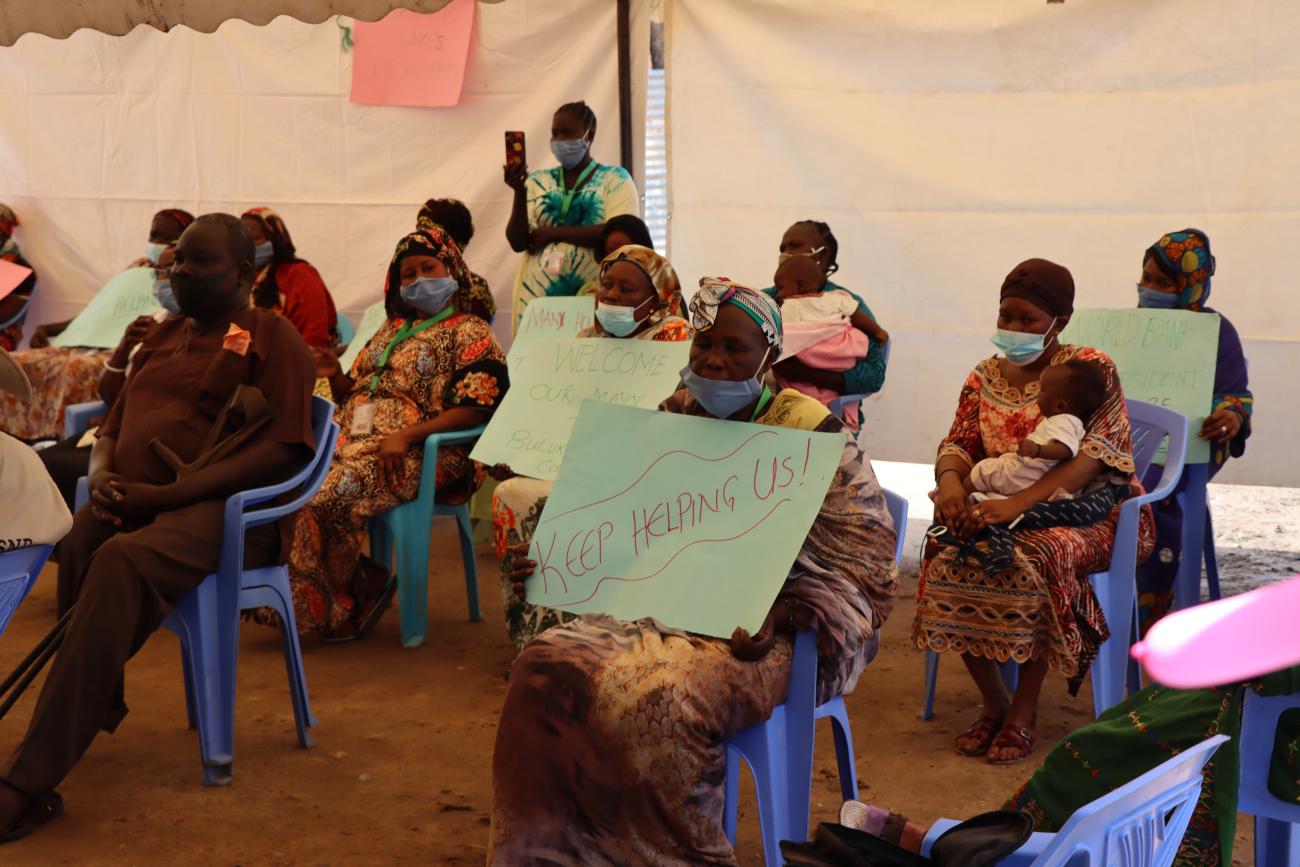“A country cannot develop without empowering women,” says World Bank Regional Vice President for Eastern and Southern Africa

The World Bank Regional Vice President (RVP) for Eastern and Southern Africa, Hafez Ghanem, visited Buluk Quarter Council in Juba Municipality
The World Bank Regional Vice President (RVP) for Eastern and Southern Africa, Hafez Ghanem, visited Buluk Quarter Council in Juba Municipality on his first official mission to South Sudan, where he heard first-hand testimonies from beneficiaries and community committees on the impact of the World Bank-funded South Sudan Safety Net Project (SSSNP) on people’s lives.
Implemented by the United Nations Office for Project Services (UNOPS), in partnership with the Government of the Republic of South Sudan, the SSSNP provides low-income and vulnerable households across 10 counties in South Sudan with cash assistance to meet their urgent needs and invest in their household welfare.
Ousmane Dione, World Bank Country Director for Eritrea, Ethiopia, South Sudan and Sudan; Hon. Josephine Joseph Lagu, the National Minister of Agriculture and Food Security; Hon. Lily Kapuki Jurkin, the Central Equatoria State Minister of Agriculture, Environment and Forestry, John Ogoto Kanisio, Undersecretary of Ministry of Agriculture and Food Insecurity and Husam Abudagga, World Bank Country Manager for South Sudan accompanied the RVP during the site visit, which provided an eye-opening experience on how the SSSNP is helping to rebuild lives and livelihoods of the communities.
Speaking at the event, the World Bank Regional Vice President Hafez Ghanem, expressed his appreciation for the partnership between the World Bank, UNOPS and the South Sudan Government towards addressing economic vulnerabilities in the country. “I am happy to hear that you have used the money to buy food for your families, pay school fees for your children and invest some of it in sustainable businesses. You are responsible citizens, mothers and leaders of your community. A country cannot develop without empowering women,” he said.
The National Minister of Agriculture and Food Security, Hon. Josephine Joseph Lagu, appreciated the support from the World Bank and UNOPS towards transforming the lives of the poor in South Sudan. “With the cash they received they have done a lot for their families. This is remarkable and we greatly appreciate them for this. This is the spirit we’d like to cultivate in our people,” she said.
The Central Equatoria State Minister of Agriculture, Environment and Forestry Hon. Lily Kapuki Jurkin thanked the World Bank and UNOPS for involving the state government in the implementation of the project and for building the capacity of government institutions to implement similar projects in future. “We appreciate your efforts in building the capacity of government institutions to be confident and capable of delivering services to the people of South Sudan,” she said.
The Acting Head of Programmes of UNOPS and Senior Project Manager of the SSSNP, Leslie Mhara said after the visit, “In order to tackle the impact of COVID- 19 and foster economic recovery, UNOPS is committed to working with the World Bank and the Government of the Republic of South Sudan. Cash transfers present a cost-efficient way to support the most vulnerable, contributing to market systems by increasing the purchasing power of community members.”
Speaking on behalf of the beneficiaries, Ms. Josephine Justin Ladu, a widow and sole breadwinner for her family, appreciated the assistance from the project, “The project started during COVID-19 pandemic, a period when life was extremely hard. Most women struggled to take care of their families. From the project, I was able to put food on the table and started a small business to sustain my family. I also used the money to buy materials to teach my daughters beadwork so that they will cater for some of their scholastic needs.”
The SSSNP targets poor and vulnerable households, especially those headed by women. So far, the project has distributed cash to over 15,000 households in Juba and will reach 50,000 additional households in the coming months in Pibor, Bor, Tonj South, Kapoeta East, Gogrial West, Torit, and 3 new counties yet to be identified.







